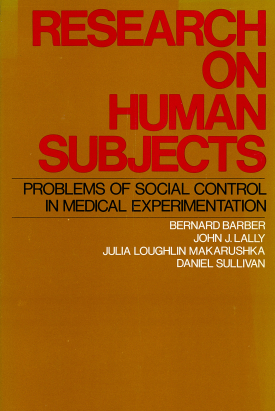
Research on Human Subjects
About This Book
How are human subjects treated in biomedical research? What are the expressed standards and self-reported behavior of biomedical researchers in regard to what has sometimes been called their “animal of necessity”? What are some of the determinants of the “strict” and “permissive” patterns which describe the standards and behavior of biomedical researchers? These are the important questions asked and answered in Research on Human Subjects. It is a book based on four years of intensive research. Two studies were completed, one on a nationally representative sample of biomedical research institutions, a second on a sample of 350 researchers who actually use human subjects.
In their chapters on “the dilemma of science and therapy,” the authors look at the tension between the values of humane therapy and discovery in science. They show that the significant minority of researchers who are “permissive” on the issues of informed consent and a favorable risk-benefit ratio are more likely to be those who are “relative failures” in pursuing the science value.
Research on Human Subjects also documents the inadequate training that biomedical researchers get in the ethics of research on human subjects not only in medical schools but in their postgraduate training as well. The medical schools pay relatively more attention to the scientific training of their students than they do to the ethical training that should be its essential complement.
The local peer review groups that screen research on human subjects in the institutions where it is carried on are another central focus of attention of the research and analysis reported in this book. The peer review groups do a fairly good job but, the authors show, there are various conditions of their relative efficacy which are not met by review groups in many important research institutions. The medical school review groups, for example, have not been outstanding performers with respect to the several conditions of relative efficacy.
In the concluding chapter, the authors discuss the general problem of the social responsibilities of powerful professions and make very specific suggestions for policy change and reform for the biomedical research profession and its use of human subjects.
BERNARD BARBER is on the Barnard College and Graduate Faculties of Columbia University.
JOHN J. LALLY is at Lehman College, CUNY.
JULIA LOUGHLIN MAKARUSHKA is at Barnard College, Columbia University.
DANIEL SULLIVAN, formerly of Barnard College, now teaches at Carleton College.
